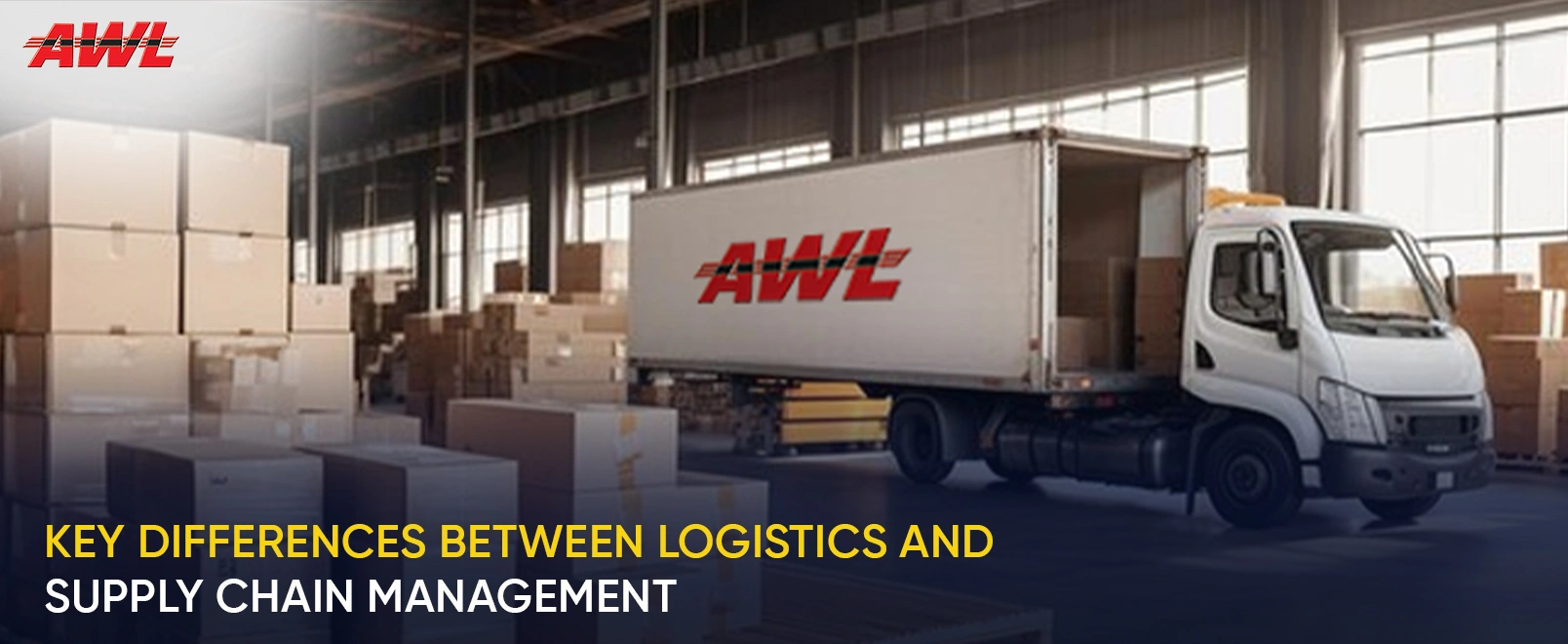
Key Differences Between Logistics and Supply Chain Management
25 July 2025

In the modern, fast-paced and globalized economy, logistics and supply chain management are names that are used interchangeably. Although both are involved in the smooth running of any business touching on the movement and delivery of products, they are two different fields of operation. The distinction between logistics and supply chain management is a crucial aspect of comprehension that businesses aimed at maximizing their operating efficiency and customer satisfaction should consider.
This blog will explain such differences, their respective purposes, and how they are less complementary than they may seem, in the larger picture of foreign trade and business within the world.
What is Logistics?
Logistics mainly involves planning, execution and control of the flow and storage of goods, services or information within a supply chain. It is concerned with the right product to the right customer at the right time, place and cost. The warehouse, packages, transportation, inventory control and order fulfilment are areas of logistics.
Logistics consists of two major groups:
- Inbound Logistics: The process of receiving, storing, and distributing raw materials.
- Outbound Logistics: The process of delivering finished products to the end customer.
Logistics management ensures smooth coordination between the point of origin and the point of consumption, maintaining a streamlined flow of materials and products.
What is Supply Chain Management?
Supply Chain Management (SCM) is a broader and more strategic concept. It involves the management of the entire network of entities—suppliers, manufacturers, distributors, and retailers—engaged in the production, handling, and distribution of a product or service. SCM encompasses everything from sourcing raw materials to delivering the final product to the customer.
The goal of supply chain management is to improve long-term performance by creating value for customers and stakeholders. It focuses on building partnerships, managing resources, improving efficiency, and minimizing costs across the entire supply chain.
Logistics and Supply Chain Management: A Comparative Overview
To understand how logistics and supply chain management differ, let's break them down based on various functional aspects:
1. Scope of Operation
Logistics has a narrower focus compared to SCM. It mainly involves the transportation and storage of goods. In contrast, supply chain management has a broader perspective that includes product development, procurement, production planning, and customer service, in addition to logistics functions.
2. Objective
The primary objective of logistics is customer satisfaction through the efficient and timely delivery of goods. It is more concerned with short-term goals and day-to-day operations.
On the other hand, the goal of supply chain management is to achieve long-term competitive advantage by optimizing the entire value chain. It aims to integrate various functions and processes to deliver value to the end consumer.
3. Flow Management
Logistics focuses on the physical movement of goods and information. It deals with the flow of products from one location to another and ensures proper handling and storage.
Supply chain management goes beyond physical movement. It manages the flow of information, finance, and goods across all stakeholders involved in the production and distribution cycle.
4. Interdepartmental Involvement
Logistics generally involves departments like transportation, warehousing, and distribution.
In contrast, supply chain management involves a wider range of departments, including procurement, marketing, finance, human resources, and even IT. It requires collaboration across all levels of an organization.
5. Time Frame
Logistics operations are typically transactional and operational, with a short-term focus. They are designed to meet immediate demands and resolve current challenges.
SCM is more strategic and long-term. It involves planning and forecasting to prevent future issues and streamline the entire supply chain for sustained growth.
The Role of Inventory Management
An essential component that bridges the gap between logistics and supply chain management is inventory management. It ensures that the right amount of stock is maintained to meet customer demand without overstocking or understocking. While logistics focuses on storing and moving inventory, SCM utilizes data from inventory trends to forecast demand, plan procurement, and reduce holding costs.
Integration of Supply Chain and Logistics for Business Growth
Modern businesses can no longer afford to treat logistics and supply chain management as separate silos. The integration of supply chain and logistics operations allows companies to respond more swiftly to market changes, reduce costs, and enhance customer service.
For example, an efficient logistics company that specializes in timely deliveries can greatly enhance the overall performance of the supply chain by reducing lead times and increasing customer satisfaction. Similarly, the application of data analytics in SCM can offer valuable insights to optimize logistics operations.
Importance of Logistics Management in the Modern Supply Chain
As global commerce becomes more complex, logistics management plays a crucial role in maintaining the agility and responsiveness of the supply chain. By ensuring timely transportation, cost-effective warehousing, and reliable delivery, logistics professionals contribute significantly to business success.
Logistics management is also increasingly leveraging technology—such as GPS tracking, route optimization software, and automated warehouses—to enhance performance and minimize errors.
Why the Distinction Matters for Businesses
Understanding the distinction between logistics and supply chain management enables companies to assign responsibilities more effectively, implement the right technologies, and make better strategic decisions. Here are a few reasons why this differentiation matters:
- Resource Optimization: By clearly defining roles, companies can allocate resources more efficiently.
- Cost Reduction: Streamlined logistics leads to lower transportation and warehousing costs, while strategic SCM can reduce procurement and production costs.
- Improved Customer Service: Efficient logistics ensures faster delivery, and a well-managed supply chain anticipates customer needs and adapts accordingly.
- Risk Mitigation: SCM helps identify potential risks in the supply network, while logistics ensures resilience in day-to-day operations.
How AWL India Bridges the Gap
At AWL India, we understand the delicate balance between logistics and supply chain management. As a top freight forwarding company and integrated logistics service provider, we offer end-to-end solutions that ensure operational excellence across the board. Whether it’s warehousing, transportation, or complete supply chain design, our services are tailored to meet the evolving needs of modern businesses.
With expertise in both logistics execution and strategic supply chain planning, AWL India empowers clients to achieve agility, transparency, and cost efficiency. Whether you’re looking for freight forwarding services, smart warehouse solutions, or scalable logistics models, we’ve got you covered.
Conclusion
While logistics and supply chain management are closely intertwined, understanding their differences is crucial for building resilient, efficient, and customer-centric business operations. Logistics focuses on the movement and storage of goods, while SCM takes a broader, strategic view of how raw materials become finished products delivered to customers.
In a competitive and dynamic market, businesses that align both logistics and supply chain functions are better positioned to grow, adapt, and lead. With the support of a reliable logistics company like AWL India, organizations can stay ahead of the curve and deliver exceptional value at every stage of their operations. Explore more about our logistics and supply chain solutions at our official website.

John Smith
Digital Tech Head